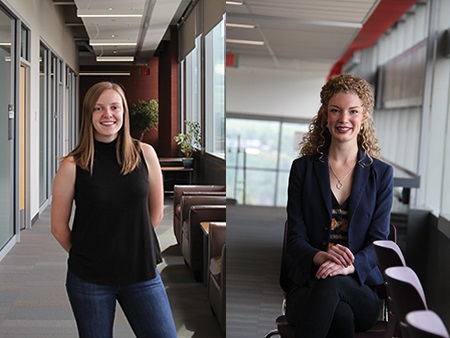
Brynn Murphy, left, is working in the aerosol lab and Tori Thomsen, right, is surveying indigenous student participation in the Faculty of Engineering.
VICTORIA THOMSEN: I am in fifth-year mining engineering at the U of A, and I received an undergraduate research scholarship from NSERC. I'm doing a project under the supervision of Dr. Ania Ulrich, associate dean of outreach.
I'll tell you a little story. The Faculty of Engineering sits on the traditional lands of indigenous people, which has seen thousands of years of knowledge. So I questioned why there are so few indigenous people in the Faculty and why their traditional knowledge is so hard to find in the engineering world. This is the question Ania gave me for my summer research.
So I have been busy data mining, just to figure out how many of our students have self-identified as indigenous. How does this compare to other faculties at the university? And to other engineering schools across Canada? Also, I've been trying to gather the perspectives of our current undergrad students that have self-identified as indigenous. What do they think the Faculty of Engineering can do to help them on their academic journey? We can use this information for recruitment.
I would like to facilitate an engineering undergrad student group. I am reaching out to our current indigenous students by email and word of mouth to see if there's interest. I've also been looking at what resources are already available to indigenous students on campus, and considering how we can build the resources and find out if there are other needs.
The scope of the work I'm doing for the NSERC grant is 40 hours a week for four months. But I'll be working into the fall because it's something I am really passionate about. I will eventually have a report summarizing all my work and giving recommendations. In 2018, I will be doing a master's degree and my master's project is involved with working with an indigenous community to meet a need that the community identifies. My NSERC scholarship is a nice to bridge to that.
Engineering is all about processes, systems, and relationships. Our ethical obligation is to serve and protect the public and environment from harm. That's definitely what I am doing. With research, you have to find what fuels your fire.
BRYNN MURPHY: I'm a fourth-year mechanical engineering co-op student. For this four-month work term, I approached Dr. Warren Finlay and asked him if he would be interested in doing a project with me. Through him I applied for an NSERC grant. The co-op program requires that I get paid for work and the grant allowed that to happen.
The project, very generally, is in the aerosol research lab. I am looking at three different budesonide inhalers. Budesonide is a drug used to treat asthma and chronic obstructive pulmonary disease-COPD. There are three different commercially available inhalers and I'm testing them. They are made by different companies and ideally they are producing the same drug. We want to see if they are really all doing the same thing. That's the end goal of my project.
It's for information, but hopefully in the future it can help us improve inhaler devices. One of the inhaler is the only budesonide inhalers available in Canada. The other two we had to order from Europe.
Dr. Finlay has been interested in this question. He figured out the project and asked me if I wanted to do work that was more computer, or more hands on. I don't have a lot of experience in fluid dynamics. And this experience has been good, it will help me with fluid dynamics classes. I am learning so much.
After this, I have three years until I graduate. The co-op program adds an extra year to the program, but I'm also doing an extra year on top of that one, so I don't have to take six classes every semester!
At the end-I am trying to figure out what I want to do and the co-op program is helping me see where I want to take my degree, because mechanical is so broad, you can take it into any industry. I am thinking I want to go into the creative side, maybe research and development. Maybe that means a graduate degree, maybe not. I would definitely recommend this to other students.